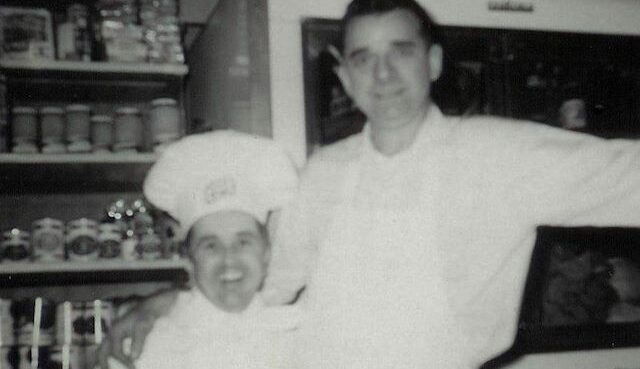
Walking my dog, Antonio Michelangelo Martello, has proven to be an enlightening experience. As we casually stroll through beautifully preserved Pullman. I not only have the opportunity to visit with any Pullmanites we see. I also get to take note of the changes made to Pullman’s original architecture.
Since 1907, all of the residences in Pullman have been privately owned. In 1897, the Illinois Supreme Court ruled that the company could not own homes as that was outside of its corporate charter. As the residents purchased their homes, they were able to make changes to their properties as they liked.
Another result of the Supreme Court ruling was that anyone who w ganted to start a business out of their home could do so. Many women opened beauty shops in their living rooms and basements, such as the one Adalgisa (Ada) Fabris had in her home at 11411 St. Lawrence Ave. (photo compliments of James Arvia)
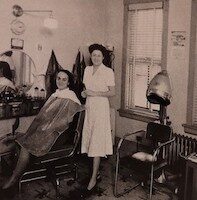 Another business type that popped up throughout Pullman and did well for many years was the family grocery store. Almost every other block had a small grocery store created in the front living area of the residence.
Another business type that popped up throughout Pullman and did well for many years was the family grocery store. Almost every other block had a small grocery store created in the front living area of the residence.
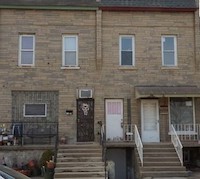
Five years ago, when Ann and Ron Vezina visited with me in Pullman, we took a walk past the house where Ann grew up. The residence was on Langley Avenue, in the middle of the block. Ann shocked two young men who were sitting on the porch when she approached them and told them the porch they were sitting on was the site of her local grocery store.
She recalled how she and her friends hung out on that very same porch playing games and eating candy and ice cream they bought in the store. I can’t help but think of Ann and Ron whenever Antonio and I now pass that building.
Having been a frequent visitor to Pullman, but not having grown up in Pullman, I was surprised when the late Annette Covollo mentioned that her dad had a store directly behind where my present house is on St. Lawrence Ave. Mario’s was the local 114th Street store, with most of his customers coming from Champlain Avenue and the south end of Langley Avenue. Mario even had a visit with the original Oscar Mayer. (Photo compliments Annette Covollo Williams)
On my block of St. Lawrence Avenue, almost every day at 9 a.m., 3 p.m. and 9 p.m., Antonio and I pass by Fattori’s Square Deal building. The building is still in the family and I was able to speak with my former St. Anthony’s classmate Denise Fattori Alcantar about her family’s business.
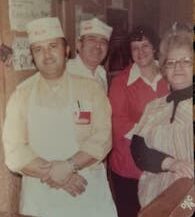 Her dad had a well-deserved reputation as the neighborhood hero to many of the local kids. Besides running the business with his brother Hank and his sister Mary, Joe enjoyed treating the neighborhood kids to excursions to Comiskey Park for a White Sox game or to the Chicago Stadium for a Blackhawk game. Of course, the seats were in the high up back row range. Regardless, it was a treat for the neighborhood kids and they thought the world of Joe Fattori.
Her dad had a well-deserved reputation as the neighborhood hero to many of the local kids. Besides running the business with his brother Hank and his sister Mary, Joe enjoyed treating the neighborhood kids to excursions to Comiskey Park for a White Sox game or to the Chicago Stadium for a Blackhawk game. Of course, the seats were in the high up back row range. Regardless, it was a treat for the neighborhood kids and they thought the world of Joe Fattori.
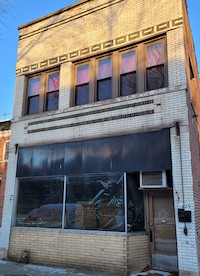
Square Deal was a great neighborhood anchor and was well-known as a community resource when there was a need. When there was a strike at Sherwin Williams, where many of the Pullman neighbors were employed, the strikers knew their credit was good with the Fattoris.
Shown in the photo are the Fattoris: Hank, Joe, Mary and Gina (Denise’s mother. Photo compliments of Denise). Other neighbors on St. Lawrence also knew that the Fattoris could be counted on should the need arise. There were many times when people came into the store to talk in confidence about a private matter and would walk out financially able to meet an unexpected obligation.
Square Deal wasn’t just a local grocery store. The Fattoris made their own salami, sopressa, cudighi and sausage. A little remembered fact is that they actually provided those meat items to many of the local stores that were well known for their Italian meat offerings.
I recall a story told to me by Joan Carli Bauer who grew up on St. Lawrence Avenue across the street from the Square Deal store. When she and her mother returned from the Fattori’s store, Joan immediately broke into tears. When her mother asked what was wrong, little Joanie admitted that she had eaten three grapes while they were in the store and she was afraid of getting into trouble for stealing because God sees everything. Her wise mother made the pain go away by telling Joan the Fattoris had plenty of grapes and taking three wouldn’t hurt them.
As the larger supermarkets like A & P and Hi-Low came into Roseland, the small neighborhood stores began to fade away. Square Deal came into being in 1947 and closed its doors in 1989, which was a very good run. With Denise’s family living upstairs, Denise and her brother Joe both got to work at the store. Joe primarily did deliveries while Denise worked the store. Square Deal was never opened on Sunday because her dad said, “God rested on Sunday and so do we!”
Copies of “Petals from Roseland: Fond Memories of Chicago’s Roseland, Pullman and Kensington Neighborhoods” are available with prompt first-class delivery at $20 + $5 s&h. The book has sold more than 600 copies since it became available a year ago. Roselandites who have bought my book are very excited to have their memories brought to life. I’m thankful for the opportunity to have provided so many fond memories of Roseland.
 Fra Noi Embrace Your Inner Italian
Fra Noi Embrace Your Inner Italian






